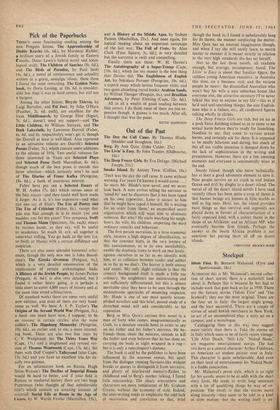Pick of the Paperbacks
THERE'S some fascinating reading among the new Penguin fiction. The Apprenticeship of Duddy Kravitz (4s. 6d.), by Mordecai Richter, a brilliant story of a Jewish family in Eastern Canada; Oscar Lewis's hybrid novel and socio- logical study, The Children of Sanchez (8s. 6d.), and The Birds of Paradise, by Paul Scott (4s. 6d.), a novel of reminiscence and actuality written in a grave, nostalgic idiom: these three I found the most rewarding. The Golden Note- book, by Doris Lessing, at 10s. 6d. is consider- ably less than it was in hard covers, but still not a bargain.
Among the other fiction, Bicycle Thieves, by Luigi Bartolini, and Pal Joey, by John O'Hara (Panther, 2s. 6d. each), are excellent for the train. Middlemarch, by George Eliot (Signet, 7s. 6d.), doesn't need my support-and The Little Children, by William Saroyan, and The Dark Labyrinth, by Lawrence Durrell (Faber, 6s. 6d. and 6s. respectively), won't get it, though the Durrell at least is well-liked. Also reprinted in an attractive volume are Durrell's Selected Poems (Faber, 5s.), which contain some additions to the edition of 1956. Two useful volumes for those interested in Yeats are Selected Plays and Selected Prose (both Macmillan, 8s. 6d.), though much of the best prose is outside this latter selection-which certainly won't be said of The Diaries of Franz Kafka (Peregrine, 18s. 6d.), a book of enormous interest.
Faber have put out a Selected Essays of W. H. Auden (7s. 6d.) which misses some of the best essays-and they could well have made it larger. As it is, it's too expensive-and what can one say of Eliot's The Use of Poetry and The Use of Criticism (Faber, 6s.), except that you can find enough in it to excite you and madden you for ten years? Two symposia, Swift and Thomas Mann (Spectrum, 16s. each), essays by various hands, as they say, will be useful to academics. So much lit. crit. all together is somewhat stifling. You go back to the text (i.e. to Swift or Mann) with a certain diffidence and suspicion.
There are also some splendid historical refer- ences, though the only new one is John Board- man's The Greeks Overseas (Penguin, 6s.), which is a very detailed examination of the implications of certain archzeological finds. A History of the Jewish People, by James Parkes (Penguin, 4s. 6d.), is also very detailed, but I found it rather heavy going; it is perhaps a little short to cover 4,000 years of history and at the same time avoid arbitrariness.
Of standard works there are some very useful new editions, and most of them are very hand- some as well. We have A. J. P. Taylor's The Origins of the Second World War (Penguin, 5s.), a book one must have now, I suppose, to be an courant in certain circles; also the same author's The Hapsburg Monarchy. (Peregrine, 10s. 6d.), an earlier and, to me, a more interest- ing book. There are also two fine texts by C. V. Wedgwood: her The Thirty Years War (Cape, 15s.) and a lengthened and revised ver- sion of Thomas Wentworth (Cape, 13s. 6d.). Set them with Duff Cooper's Talleyrand (also Cape, 13s. 6d.) and you have an excellent trio for ex- actly two guineas.
For an informative book on Russia, Hugh Seton-Watson's The Decline of Imperial Russia would Be hard to better, and if your field is Roman or medieval history there are two huge Papermacs (who thought of that unbelievable title?) which contain an amazing amount of material: Social Life at Rome in the Age of Cicero, by W. Warde Fowler (Macmillan, 15s.),
and A History of the Middle Ages, by Sydney Painter (Macmillan, 21s.). And once again, for topical reading about an important campaign of the last war, The Fall of Crete, by Alan Clark (Four Square, 3s. 6d.), is very detailed but the narrative is swift and compelling.
Finally there are these: W. H. Davies's The Autobiography of a Super-Tramp (Cape, (10s. 6d.), which for my money is the best thing that Davies did; The Englishness of English Art, by Nikolaus Pevsner (Peregrine, 10s. 6d.), a superb essay which invites frequent visits; and two quite absorbing travel books: Arabian Sands, by Wilfred Thesiger (Penguin, 6s.), and Brazilian Adventure, by Peter Fleming (Cape, 12s. 6d.).
All in all a wealth of good reading between thin covers. I do think some of them are too ex- pensive though. A guinea is too much. After all, I thought that was the point.
KEITH HARRISON


































 Previous page
Previous page